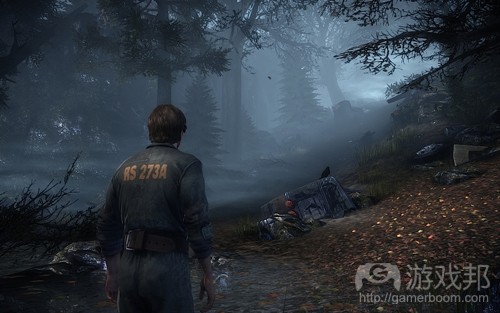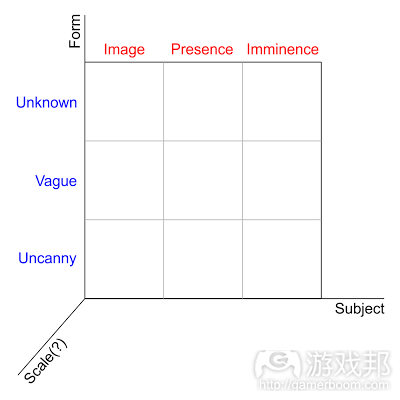分析恐怖游戏令玩家产生恐惧感的原因(1)
作者:Luis Guimaraes
“最古老而最激烈的人类情绪就是恐惧,而最古老最强烈的一种恐惧就是对未知的恐惧。”——H.P. Lovecraft(恐怖小说家和编剧,代表作有《恐怖大师》、《恶魔的呼唤》等)
恐怖大师的这句名言经常被引用于对电子游戏的恐怖和恐惧主题的探讨。“最大的恐惧就是未知的恐惧”。是的,我们确实害怕未知……但到底什么才是未知?另外,为什么未知会让我们恐惧?
在本文,我们将探讨未知在恐怖游戏中的不同用法,以了解未知的内在运作方式,如果成功的话,也许我们能进一步分析和讨论这个话题,并得出更深刻的答案。
有些普遍的东西虽然相同,但往往有不同的叫法,比如,“迫近的危险”被叫作“悬疑”,对未知物的暗示被叫作“神秘”。这是真的也是正确的,但使用这些术语并不能帮助我们从“一切都是信息”的角度出发研究恐惧的产生和发展的机制,而这正是本文要做的。另外值得注意的是,本文的结论都是根据我个人的观察和研究得出的,所以你可以说我的假设是错的或对这个话题存在误解。毕竟,这种探索是艺术,不是科学。
现在,我们进入正题吧!
未知
这个词本身表达的意思是,缺少信息或信息有限;这个信息可以是我们正在处理的信息来源的对象的任何方面或细节。它可以关于信息的不同但平等的成份,也可以是信息的不同层次的成份。你不可能知道(因缺少信息)某人叫什么名字、从事什么行业、来自哪里,或者你可能知道(因信息有限)某人生病了,但不知道具体是什么病。
本文的分析的围绕中心是,阻止接受者收到信息的方式和存在或缺失的信息如何影响我们的大脑处理信息。当你得到的信息过多时,你的大脑会过滤掉它认为不必要或不重要的信息碎片,而只处理在当时的情况下你必需的相关的信息碎片。类似地,当你收到的信息量有限且大脑认为这些信息量不足以提供安全感时,那么你的大脑就会进入一种放大它的外推能力的状态,因此,“未知的恐惧”被解释为“你的想象比任何东西都可怕。”
为了让信息接收者产生恐惧感,有三种信息最经常被抑制,它们也是当玩家给恐怖游戏打分或评论时最经常被提及的:
1、影象:某物的形状、轮廓或图形描绘——“直到你看到以前它都是吓人的”,“你害怕你看不到的东西”、“当我看到怪物时,我就不再怕它了”,“精明的系统有意阻止你看到怪物,否则你就不会害怕它们了”,“这款游戏的头一个小时是最刺激的”……
2、存在:某物的位置或去向,和/或它在游戏世界和/或在玩家附近的存在的确认——“你被暗中监视的感觉”,“当打开门时却发现没人”,“当风吹灭蜡烛的时候”,“楼上的脚步声”……
3、迫近的危险:威胁和/或某事件发生的可能性——“你不知道某事什么时候会突然发生在你身上”,“桥快塌的场景最令人害怕”……
但是,我们的想像就是我们最害怕的吗?如果是,我必须告诉你,在这个世界上,你不知道的东西总是远远超过你知道的东西!现在有多少种无害可食的水果存在?你现在所在的地方距离1743年4月9日下午2点45分的火星的南极有多远?你现在穿在身上的衣服在2048个月后会在哪里?暗物质是由什么化学元素组成的?你不知道吧!哈哈哈哈!
你现在怕了吗?你应该怕啊!我们最害怕的不就是未知吗?
但面对这么未知的东西,为什么我们还没有完全丧失理智呢?“那些都是不重要的事!”,你现在肯定会这么说,但真相是,我们甚至不知道我们所不知道的东西是否重要。但如果重要会怎么样呢?如果我们的生命就取决于这些我们不知道的东西呢?如果我们知道了所有那些东西且由于某些原因它们没有被强制忘记呢?如果认真地考虑这些问题,你就会开始觉得可怕了。那是因为已知信息的重要性不足以让大脑做出任何推测,这些接收到的信息没有让我们觉得面临时间压力(认为不紧急)、有风险(认为可能遭受损失)和危及人身安全(认为是危险的)。
只有在这些正确的方向上暗示,我们才会觉得未知信息是重要的。你可能已经猜到我所使用的“暗示”不只是关于隐藏信息,也关于暴露能体现重要信息缺失的信息。这也就是我们所谓的“意识到缺少了重要信息”——未知感。如果没有这种未知感,那么事实上等于没有任何未知。
关键是,只有当我们产生未知感时,未知才存在。这就是未知感的作用。所以为了激起玩家的恐惧感,必须先让他们意识到自己不知道所有必须知道的东西。如果玩家不能发现自己不知道重要的信息这个事实,那么他就没有理由感到恐惧。
但这就出现了一个问题:资深玩家习惯于认为游戏默认是“公平的”,因此如果有什么事是不知道的,那件事一定是不重要的。如果恐怖游戏中没有枪,游戏告诉你没有枪你也可以玩下去且你心里知道游戏是平衡的,那么为什么你还要害怕没有枪?如果游戏中有枪和大量弹药,突然间把你跟五只怪物锁在同一间房间里,游戏告诉你五对一是公平的战斗,那么为什么你要害怕它们而不是它们怕你?
所以,如何防止玩家以一种随遇而安的态度玩游戏,即不在乎什么是未知的?本文的答案是,你应该意识到已知和未知的关系不只是二元的。我们通过把信息置于已知和未知之间的界线,使玩家产生未知感,让玩家觉得需要这些信息并把这些信息的重要性提高到必要的程度上,这样玩家的想象力就会被激活了。
类似的,至于如何抑制信息,方法有很多,信息的暴露方式也是不同,且有不同的效果。为了更准确地使用,我们可以把信息的抑制方式分类。
本文将探讨的信息构成如下:
1、未知的:缺少信息——你知道或不知道自己缺少信息;
2、模糊的:信息成分不全或含糊——你有信息,但那不是关键信息
3、离奇的:信息成分之间存在冲突矛盾——你对你应该知道的东西不再确定。
注意,信息可以以不同的程度存在,但在这方面我们不过多介绍,因为那是属于艺术性解读和使用的范畴,尤其是因为它会随着当时重要的信息是什么而有所不同。为了帮助你理解它,我举一个例子,你可以看到远处站着一个人,但不知道他的眼睛是什么颜色的。这可以是缺少信息(对眼睛颜色的未知)或信息不完全(对关于这个人的细节的未知),取决于这个信息被认为的重要性达到什么程度。这个方面是非常复杂的,且变化多端,取决于具体的情境,所以它是被我们认为理所当然的部分,在我们研究其他两个已经讨论过的方面时,我们会把它分离出来。如果读者想在这篇基础文章中补充它,那么请随意。
在之后的文章中,我们将研究各个组合的案例——不一定是本文将要探索的二维座标系中唯一的元素。
图:你可以把电子游戏、电影和书籍中的事件填写到方格中吗?(本文为游戏邦/gamerboom.com编译,拒绝任何不保留版权的转载,如需转载请联系:游戏邦)
Fear Of The Unknown, Part 1
by Luis Guimaraes
The oldest and strongest emotion of mankind is fear, and the oldest and strongest kind of fear is fear of the unknown.
– H.P. Lovecraft
The famous horror master is frequently cited in discussions surrounding the subject of horror and fear in video-games. “The biggest fear is fear of the unknown”. That’s correct, we do fear the unknown… But what, exactly, is the unknown? Also, how does this Fear of the Unknown work?
In this article we’ll be exploring some of the different usages of the unknown in horror games, trying to have a glimpse of it’s inner workings and, if successful, open a path to further analysis and discussion of the subject so we can step every time closer to having this figured out.
There will be things that are commonly known and normally called by different names, for example, imminence is dubbed “suspense”, and hints of the unknown is dubbed “mystery” or “negative space”. That’s all true and also correct, but the usage of those terms won’t help our studies of the mechanics of how fear is originated and nurtured from the point-of-view of everything being about information, which’s what we’re doing here. Also important to note is that all the considerations taken are based on observation rather than research, so feel free to come out and say that my assumptions are wrong about both the subject and the perceived misconceptions around it. It’s an art and not a science after all.
Now, let’s have some fun!
Unknown
The word itself conveys the existence of a lack or limitation of information, and this information can be about any of many aspects or details about the subject of which we are dealing information from. It can be about different parallel pieces of information, and it can also be in different levels of information. You can not know (lack information of) the name of a person, or not know what field they work on, or where they come from, or you can know they are sick and not know what illness they have (limitation of information).
The entire field of analysis in this article will revolve around the many ways information can be withheld from the receiver and how each piece of existing or missing information can affect the way our brains deal with information. When you have excess of information your brain will filter the bits deemed unnecessary or unimportant and work at conscious level only with the relevant bits to whatever you’re having to deal with at the moment. Similarly, when the amount of information you’re getting is limited and deemed insufficient to give the sense of security to work with, your brain will enter a state that amplifies it’s extrapolation capacities, hence “fear of the unknown” is interpreted as “your imagination is scarier than anything”.
Three bits of information most commonly withheld from the receiver to create the unknown in horror games – and commonly asked by players when ranting or discussing about what makes a great horror game – are informations about:
a) Image: the shape, figure, or graphic depiction of something – “it’s scary until you see it”, “you fear what you cannot see”, “when I saw the monsters I stopped fearing them”, “the sanity system is intended so you don’t get a good look at the monsters otherwise you stop fearing them”, “the first hours of the game is the best”, etc;
b) Presence: the location or whereabouts of something, and/or the confirmation of it’s existence in the game’s world and/or in the player’s vicinity – “that feeling that you’re being watched”, “when the door opened and there was nobody there”, “the part when the wind blows the candles”, “the foot noises in the upper floor”; and
c) Imminence: the threat and/or likelihood of an event happening – “you don’t know when something will jump out at you”, “the sense that the bridge was going to fall”.
But is our imagination alone what we should fear most? If that’s the case, I must tell you, the amount of things you don’t know about the world outnumber the amount of thing you know by an nearly infinite number of times! How many unharmed units of edible fruit of any kind exist in the world right now? What was the distance between the place you are now and the south pole of Mars in 2:45 PM of April 9th, 1743? Where will the clothes you’re wearing now be 2048 months in the future? What are the chemical elements made of dark matter? You don’t know! MuaHaHaHaha!
This is dread man! Truly dread!
Are you scared now? You should be! It’s the unknown what we fear most, right?
But why is it we’re not completely losing our sanities over this infinite number of matters we have no knowledge (information) of? “They aren’t of any importance!”, you must be saying right now, but the truth is, we don’t even know if the things we don’t know are important or not. But what if they are? What if our lives depend on it and we don’t know? What if we knew all that at some point and for some reason it was all forcefully forgotten? If think about those questions seriously, things start sounding scary. That’s because a full binary isKnown information doesn’t sound relevant enough to warrant any consideration and from there, our brains won’t get to the step where it’ll calculate if the information received is plenty to supply our needs under the existing constraints of time pressure (perceived urgency), considered risks (perceived potential losses) and personal safety (perceived danger).
Only once hinted in the correct direction we consider the importance of not-knowing something. And you might have already guessed by my used of the word hint that it’s not only about holding information, but also about about exposing information that renders the lacking information relevant. For easier referencing of this characteristic, we’ll be calling the acknowledgment that there is a lack of further important information, by sense of unknown. Without the sense of unknown, it’s virtually as if there’s nothing unknown to begin with.
The catch is that the unknown is only present if we know about it. That’s what the sense of unknown is. So the player must be teased into the fact that he doesn’t know everything that should be known to increase his/her chances of making it out of the nightmare alive. Without teasing the player on the fact there is information of utmost importance being held away, one will not have a reason to fear it.
But here comes a problem: seasoned players will be used to games being “fair” by default, therefore if something isn’t known it’s not important information. If a horror game doesn’t feature guns, what it’s trying to tell you is that you can do it without one, therefore why would you be scared of being unarmed if the game will be balanced with that in mind? If a game has guns and plenty of ammo and suddenly locks you in a room with five monsters, what the game is telling you is that five against one is a fair fight, therefore why should you be afraid of them instead of them when it’s instead them that should be afraid of you?
So how to keep the player from approaching the game with a happy-go-lucky attitude of simply not caring about what’s not known? The solution this article is here to propose is the observation that knowledge is not only binary. It’s by riding the line between known and unknown that we can give the player a sense of unknown, give it the meaning the want it to have and raise it’s importance to the necessary levels that will focus the player into the helm of his own imagination.
Similarly as to how the information being withheld can mean many things, the ways the information can be withheld or exposed also differ and have different effects. And if they differ, we can categorize and label them for more clear usage.
The constitutions of information we’ll be exploring in this article will be the:
a) Unknown: the binary lack of information – you either know it or you don’t;
b) Vague: the ambiguous or incomplete piece of information – you have information but it’s not key information; and
c) Uncanny: the presence of conflicting bits of information – you’re not sure anymore about something you are supposed to know.
Note that information can also exist in different scales, we won’t be exploring much about them as we’ll leave this up to artistic interpretation and usage, specially because it’s variable about what’s the relevant information scale being dealt with at the moment. For understanding of what it means, you can for example see a person in the distance and not know which color this person’s eyes are. That can either be a lack of information (unknown color of the eyes) or incomplete information (unknown details about the person as a whole) depending on what scale of importance is being considered. This aspect is very complex and varies a lot depending on context so it’ll be a dimension we’ll take for granted and leave apart while working on the other two already described. If any reader wants to complete this base-article with that, please feel free, and thank you!
In future articles we’ll study examples of each combination – which are not necessarily the only elements of the two dimensions this article is out to explore.
Can you fill each combination with events from Video-Games, Movies and Books?(source:gamasutra)
下一篇:电子游戏是否真的需要交互性?









































 闽公网安备35020302001549号
闽公网安备35020302001549号